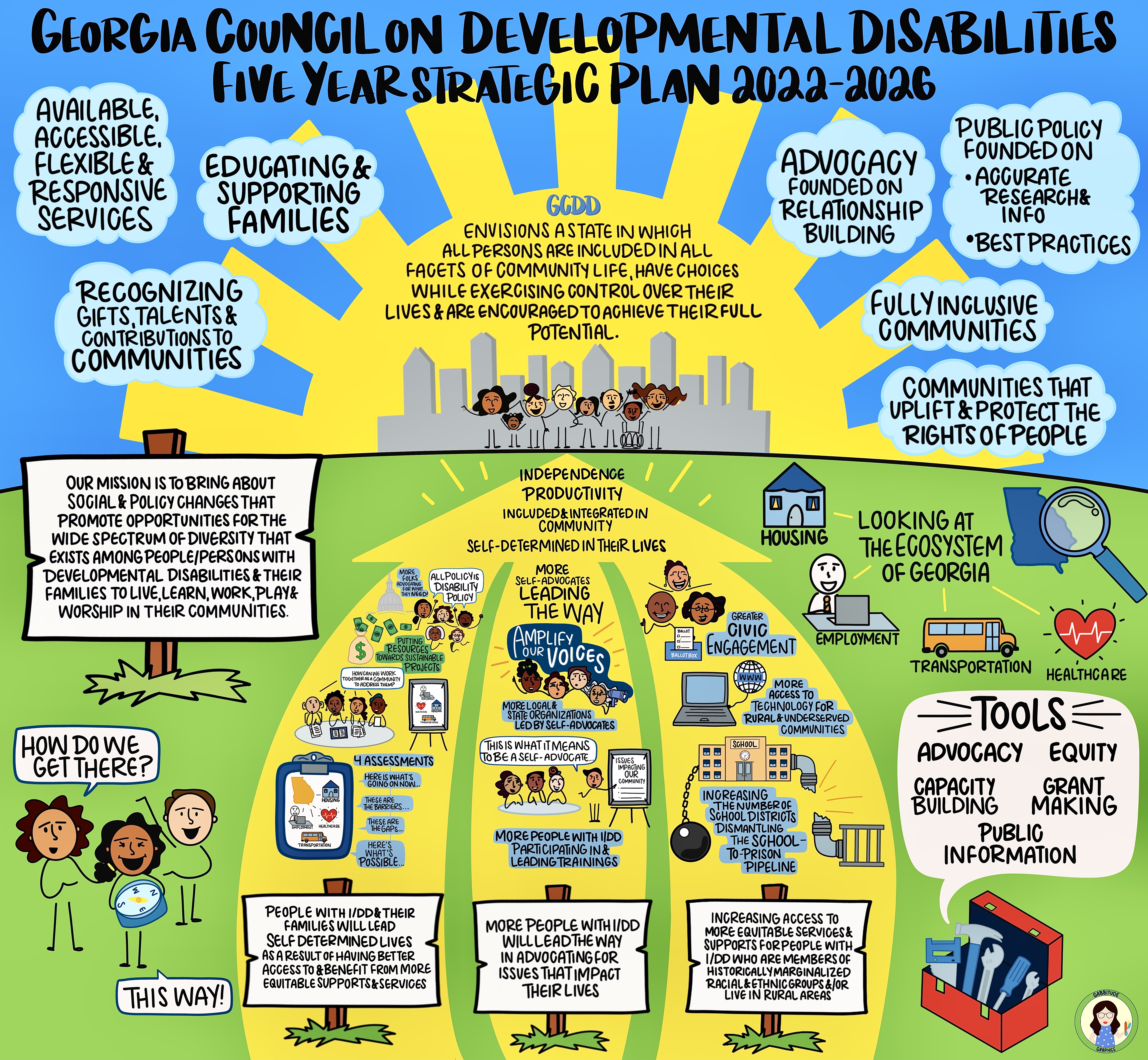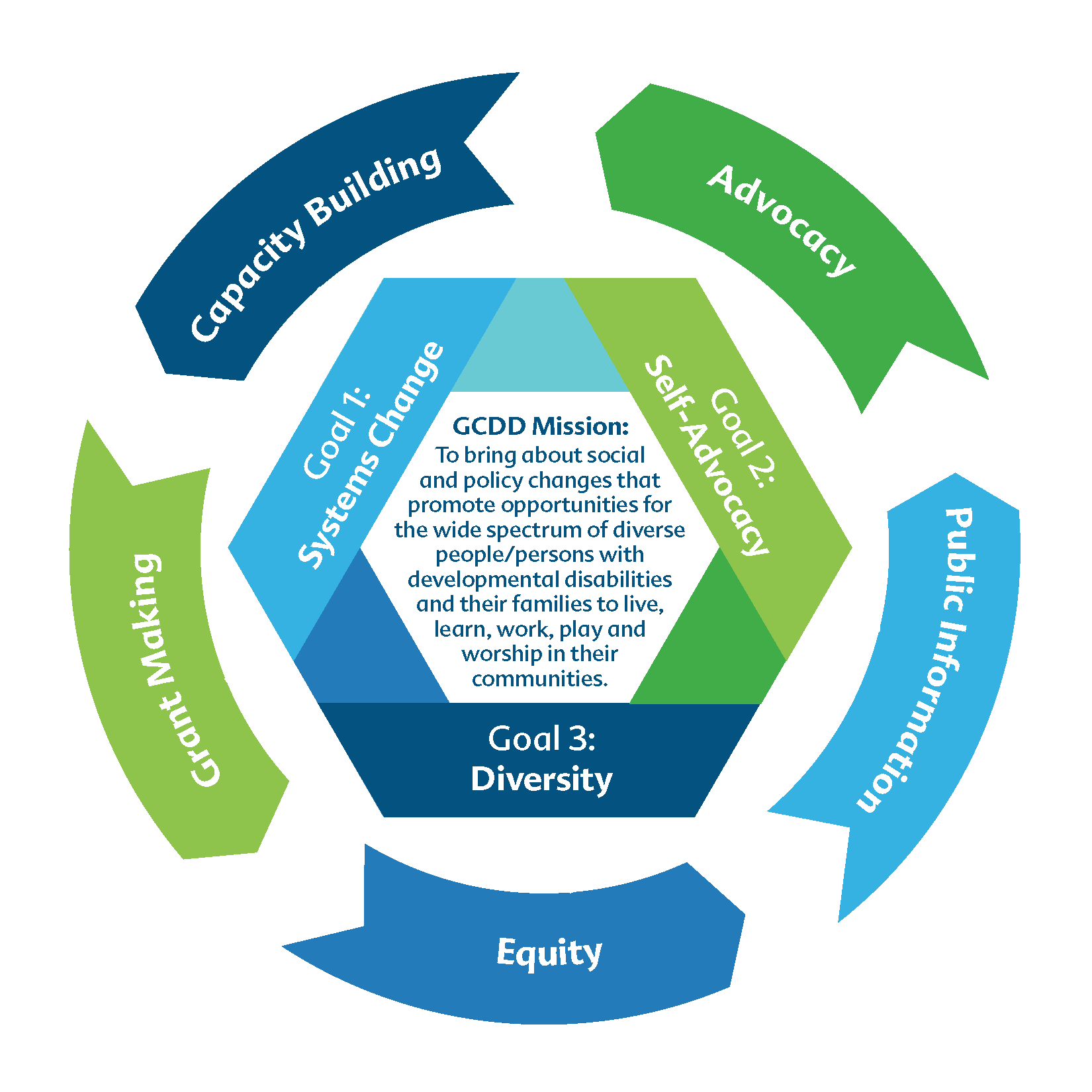New Five Year Strategic Plan (2022-2026)
 5 Year Strategic Plan Graphic created by Gabby Melnick
5 Year Strategic Plan Graphic created by Gabby Melnick
Last year, many of you participated in our townhalls to help GCDD develop its next Five Year Strategic Plan (2022 - 2026). Based on your input, GCDD drafted its Five Year Strategic Plan with three goals and their objectives to determine what GCDD will work on to build a more inclusive, integrated state for people with disabilities.

Goals & Objectives
Goal 1: Systems Change
With support from allies, advocates, stakeholders and communities, people with intellectual/developmental disabilities and their families, will have increased access to and benefit from equitable quality supports and services that increase self-determination and meet their needs and preferences.
Objective 1: By 2024, GCDD will conduct four assessments of different ecosystems comprising housing, employment, transportation, and healthcare in urban, suburban and rural Georgia and produce reports with recommendations for plans with outcomes that reflect equitable access to services and healthy communities. (“Ecosystem” refers to groups of people, organizations, government, geography and systems that either live in a specific area or work together around a specific issue.)
Research should include:
- Gather baseline data for housing, employment, transportation and healthcare.
- Determine existing barriers to access, quality and equity in housing, employment, transportation and healthcare.
- Identify which barriers to address and in which order.
- Outline agency/division to contact for information/support.
- Outline services provided in each agency and eligibility for services.
- Explore intersection of systems, legal pathways, data collection, and planning around certain issues.
- Design program evaluation to determine how to build upon federally mandated data that GCDD collects.
Objective 2: By 2027, GCDD will increase the number of rural and historically marginalized communities that bring people with and without disabilities together to address housing, employment, transportation and healthcare.
Objective 3: Annually, GCDD will increase identification, advocacy and/or sponsorship of legislative, regulatory, policy, procedure and/or practice changes at state and local levels that build capacity in in four areas of the publicly funded systems of housing, employment, transportation, and healthcare to produce outcomes that reflect equitable access to services and healthy communities.
Objective 4: Annually, GCDD will increase the numbers of new state and local advocates to at least 2000 by 2027 who build efforts around housing, employment, transportation and healthcare to produce outcomes that reflect equitable access to services and healthy communities.
Goal 2: Self-Advocacy
GCDD will provide more opportunities for the voices of individuals with intellectual/developmental disabilities to be heard by strengthening capacity among Georgia self-advocacy organizations and initiatives, supporting cross disability coalitions and leadership development programs for and by people with intellectual/developmental disabilities.
Objective 1: Annually, GCDD will increase the number of state and local self -advocacy organizations led by people with intellectual/developmental disabilities, focusing on the development of two local self-advocacy organizations in regions four and five by 2027.
Objective 2: By 2027 GCDD will increase the number of people with intellectual/developmental disabilities who participate in leadership trainings led by people with intellectual/developmental disabilities.
Targeted Disparity and Diversity Goal: The Council’s activities and those done in collaboration will be conducted with a focus on equity that increases the access of marginalized communities with particular emphasis on racial and ethnic minorities and those in rural areas.
Objective 1: By 2027, GCDD will partner with the DD Network, civil rights, and other organizations throughout Georgia to increase the number of counties that develop and implement activities that addresses the School to Prison Pipeline in four counties.
Objective 2: By 2027, GCDD will increase access to technology for people with intellectual/developmental disabilities in rural and underserved areas which impacts access to employment, housing, transportation and healthcare.
Objective 3: By 2027, GCDD will partner with state and local civic engagement organizations so that people with intellectual/developmental disabilities in rural and historically marginalized communities will have increased access to opportunities to participate in civic engagement including voting.
Goal 3: Effective and Efficient Organization
GCDD will continue to improve its operations while meeting the requirements of the Developmental Disabilities Bill of Rights and Assistance Act
Objective 1: Annually, GCDD members set the strategic direction of the organization, recruit and orient new members, and assess implementation of the strategic plan.
Objective 2: GCDD members and staff will participate in training and learning journeys on the local, state and national levels.
Objective 3: By 2023 GCDD will perform an internal audit to ensure that both Council internal and external operations adopt diversity, equity and inclusion best practices.
Objective 4: GCDD will continuously examine and make recommendations about emerging trends.
About the Five Year Strategic Plan
The Five Year Strategic Plan determines how the Council will allocate funding to create systems change for individuals with developmental disabilities and family members through advocacy and capacity building activities.
The plan is the foundation of how the Council does its work across the state. By hearing from individuals with disabilities, family members, caregivers, siblings and the community-at-large, it set the course of what the Council has to work on for the next five years.
All GCDD efforts aim to ensure that people with disabilities are independent and interdependent, have greater economic self-sufficiency, are integrated and included in their respective communities and self-determined in their lives.
Currently, the Council is working off the 2017-2021 plan that focuses on five goals: Education, Employment, Formal and Informal Supports, Real Communities and Self-Advocacy.
